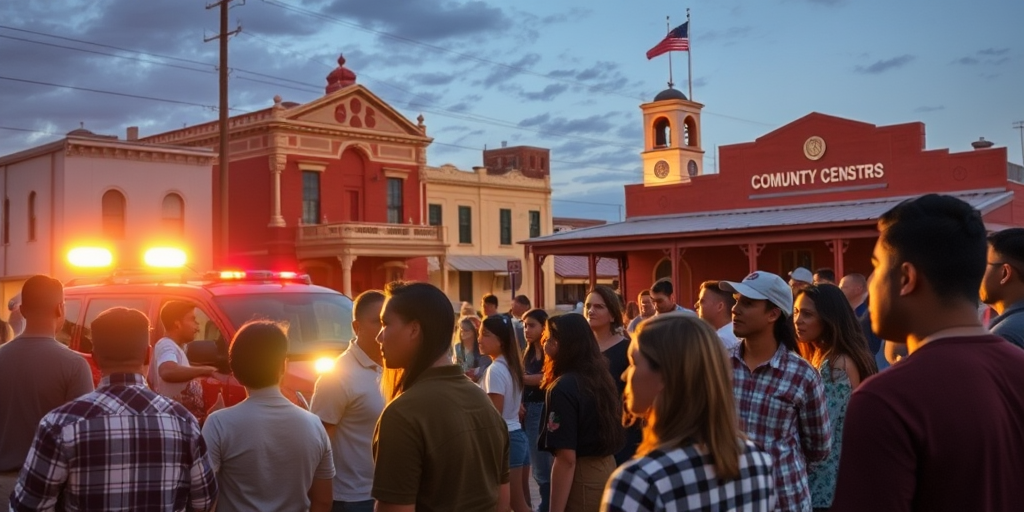**Title: ICE Raids in Cameron County Result in 12 Arrests Amid Ongoing Tensions**
Summary of ICE Operation in Cameron County
In a turn of events that further underscores the complexities of immigration issues in South Texas, U.S. Immigration and Customs Enforcement (ICE) officials conducted raids at two businesses in Cameron County, specifically targeting areas in Harlingen and San Benito. The operation resulted in the arrest of 12 individuals from Mexico and El Salvador. This ICE operation is a part of larger federal efforts to enforce immigration laws and crack down on businesses employing undocumented workers.
Notably, one woman involved in the operation is facing charges for allegedly assaulting a federal agent, adding another layer of tension to an already sensitive situation. The recent actions undertaken by ICE have become a focal point of discussion within the Rio Grande Valley (RGV) community, stirring emotions and prompting various responses among residents and officials alike.
Context and Background: Navigating Local Dynamics
This wave of ICE raids comes at a time when immigration issues are prominently affecting Valley residents. Recently, Governor Greg Abbott deployed the Texas National Guard to sites expected to host immigration protests, highlighting the escalating tensions in the border region. The ongoing struggle around immigration policy continues to shape the social and economic fabric of the RGV, where diverse communities often face the intersection of opportunity and legality.
Moreover, the legal complexities extend to educational policies, as seen with undocumented students in Texas requesting legal rights to contest the sudden termination of their in-state tuition status. Such dilemmas reflect the broader narrative of immigrant experiences in South Texas—a region known for its vibrant culture and historical significance in immigration discussion.
Views from Local Leaders and Officials
Local reactions to the ICE arrests have been mixed. Elected officials and community leaders are grappling with the implications of these federal actions on community trust and public safety. “We must balance enforcement with empathy,” stated Juan Rodriguez, a city council member from San Benito. “The livelihoods of countless Valley residents are impacted, and we need to ensure respectful dialogues and policies.”
Conversely, proponents of strict immigration laws argue that compliance is vital for national security and economic stability. An ICE spokesperson emphasized the importance of employer compliance with Form I-9, which mandates the verification of employment eligibility. The spokesperson noted, “This operation is a reminder of our commitment to enforcing laws that protect American jobs and ensure security across our communities.”
Local Impact and Community Response
For Valley residents, the impact of these ICE operations is deeply personal and profound. Local businesses, particularly those with a significant immigrant workforce, are evaluating the implications for their operations and workforce stability. “There’s a palpable sense of fear and uncertainty,” admitted Maria Gonzalez, a Harlingen business owner. “We need assurance that our workers, many of whom have been with us for years, are protected and treated justly.”
Community advocates have also expressed concerns about potential racial profiling and disruptions to family units, which are frequent criticisms of such raids. Organizations within the RGV are mobilizing resources to support affected families, including providing legal assistance and shelters for displaced individuals.
Link to Previous Events and Broader Implications
The recent ICE operation dovetails with a series of events highlighting the ongoing dialogue around immigration and enforcement in South Texas. From major policy shifts to localized incidents, these developments continually shape the region’s socio-economic landscape.
For instance, the relocation of a UTRGV football game from Brownsville to Edinburg is a logistical decision, indicative of the shifting dynamics in regional events amidst broader socio-political contexts. Similarly, local festivals like Taste McAllen are reflective of communal resilience and cultural celebration, offering a contrast to the adversities faced by many due to immigration enforcement actions.
Future Projections: Adapting to Change
Looking ahead, the Rio Grande Valley might continue to see the reverberations of such federal operations, influencing public opinion and political discourse. As issues around immigration evolve, local leaders, advocates, and residents are tasked with navigating these challenges with foresight and unity.
The community’s response to ICE activities will likely shape future enforcement strategies and policies, calling for constructive dialogue and cooperation. Ensuring transparent legal processes and advocating for immigrant rights remain essential undertakings for community organizations committed to justice and equality.
With scattered thunderstorms forecasted and the commencement of hurricane season, Cameron County’s capacity to adapt to these environmental and societal challenges will be put to the test. Public feedback on infrastructure projects, such as road widenings, exemplifies the region’s proactive approach to broader issues, aiming for a harmonious balance between growth and inclusion.
To facilitate community information access, resources and contact points are being established, helping Valley residents stay informed and engaged in decisions affecting their livelihoods. As the RGV marches forward, stories of resilience, advocacy, and solidarity are certain to continue shaping its vibrant narrative.







